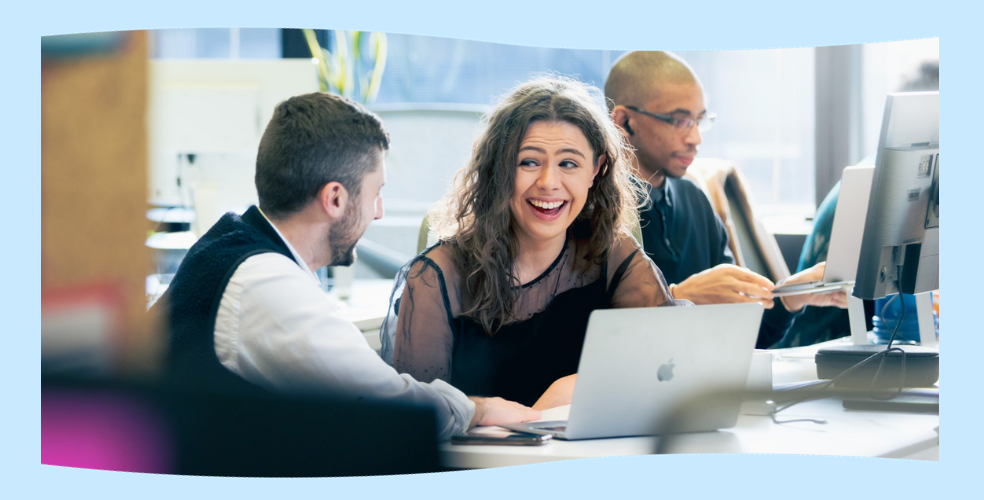I’ve been at TPXimpact for three years. In that time, I’ve joined four projects that have already been in progress – joining established teams that have been working together for a while on an existing product or service.
Joining a new team can feel hectic – you’re in a constant state of catch-up as you get up to speed with what others have been immersed in for a while. So I started to note down how I observed myself approaching these situations, and thinking about any learnings.
Through doing this, I came up with five principles that I now follow when onboarding to projects that are already in progress. These help me create trust and purpose quickly - while looking after mental wellbeing.
Patience, not pressure
I’m kind to myself, making time to find my feet and build context - and don’t put pressure on myself to prove my value immediately.
It feels obvious but is something that can be so hard to do in practice.
I confess I want the people around me to know I’m good at what I do. And I don’t want to slow things down. This can bring a lot of unwelcome, self-inflicted pressure.
So I remind myself that adding value and doing good work comes with understanding context – and that takes a bit of time and reflection. Of course, there’s definitely a back and forth battle between two voices in my head… but most of the time the calm and patient voice wins.
Clarity and alignment
I make sure I’m clear on the immediate priorities and what’s being expected of me – and that my understanding actually aligns with the team’s.
Again, this might feel obvious. But if you take it for granted, you can be stung by it later.
For example – I once joined a team to do a content audit. I did what I understood a content audit to be. But it turned out the person who briefed me had something slightly different in mind. It wasn’t catastrophic, but it’s still an important learning.
In the past, teams have expected me to be a carbon copy of a previous content designer. And it’s been a bit bumpy while I’ve just got on with the work how I usually would until we realise what’s not working.
Much of this is just taking time to listen, observe and reflect.
I talk to everyone on the team to understand how they see me working alongside them. I expect them to use the same words but for slightly different meanings, so get really literal with what people are seeing in their mind’s eye - and how they see it helping progress the work.
Flexibility in approach
I build trust by delivering what the client and team expect from me at first - and being flexible with how I approach that work.
Like everyone, I have my own unique set of preferences and skills that help me deliver my best work. But an existing team’s ways of working and plans might not immediately fit perfectly with them.
I’ll either be replacing someone who’s already shaped the role themselves, or I’m the first content designer to join that team. Either way, the work and approach are already scoped out, and the team will be expecting me to come in and pick that up.
I used to come in and want to change things to make them work for me immediately - but I’ve learned it’s easier to build trust and respect when I gently make the space for that to happen over time.
While building context, it’s easy to look at the work and priorities and question why they are. Or spot what you think is a better opportunity or approach.
But there’s more immediate value in delivering as and what's expected, recognising the context of those expectations, building trust, and waiting for a better moment to show how or where else I can add value.
Positivity, with an open mind
I try not to let other people’s experiences and opinions of a project affect my outlook.
I assume that everyone on the project is operating with the best intentions. If I’ve heard a team’s working style or priorities are different to my own, I keep an open mind and trust I’ll find a way to make it work.
I also go in assuming I’ll enjoy the work - I’m a new person, with a fresh perspective. Someone else’s impression of the work won’t necessarily match my own - we’re all different.
Intentional onboarding
Finally, I keep myself accountable to my principles and check in with myself as I go.
It’s easy to go in aiming to be patient, ensure alignment, and be flexible and open minded… but it’s also easy to forget it all the moment your feet hit the ground.
So I have to be intentional. I have two approaches to help me do this.
1. Personal mini-sprints
I write down some intentions for the week ahead. I might think about who and what I want to know by the end of the week, and where I want to feel like I’ve added value. It could even be how I intend to contribute to meetings.
For example, in week one, I aim to listen and absorb. I don’t put pressure on myself to contribute while I’m still making sense. If I do, it’s a bonus.
2. Onboarding diary
I write down learnings, observations and reflections at the end of each day – or just as they come up.
It might be:
-
how I’m feeling
-
what’s expected of me
-
team ways of working and dynamics
-
wider cultural and strategic context
-
anything else that’s interesting
This is a great way to check in with myself and make sense of what I’m learning. And to capture any ideas I have, so they’re not forgotten while I’m building trust.
Following these principles helps me be realistic with myself, and create purpose and structure in what can feel like a messy time. I check back in with them if the feeling of pressure creeps in.
In reality, I don’t always follow these principles perfectly. But having them there to fall back on helps me feel calm and assured when I’m joining a project that’s already in progress. As the weeks pass, I naturally become less reliant on them – until I feel ‘part’ of the project and don’t need them anymore.

How I’m building my confidence as a designer
Maddie shares some of the techniques she’s using to build her confidence as a content designer
Read moreOur recent design blog posts
Transformation is for everyone. We love sharing our thoughts, approaches, learning and research all gained from the work we do.

Embracing remote design sprints with Karel de Grote University College
Read all about our recent experience running remote design sprints with Karel de Grote University College.
Read more
Ten reflections on design leadership
Martin reflects on some of the lessons he’s learned about design leadership.
Read more
Find out all about what our Design team has been up to over the past few months.
Read more

